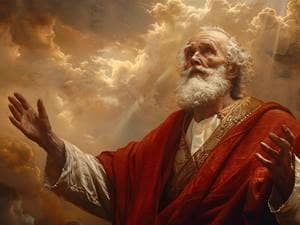The LORD told Abram, “Leave your homeland, your relatives, and your father’s family, and move to the land I will show you. I will create a great nation from you. I will bless you and make you renowned, and you will be a blessing to others. I will bless those who bless you and curse anyone who disdains you. All the families on the earth will be blessed through you.” Genesis 12:1-9 NLT
Abram was simply tending his flock when a powerful voice, audible to him alone, broke through the everyday silence. The voice made a proclamation that would seem absurd to the common mind of the day.

“A father of many nations?!” he likely pondered, as a middle-aged man without children, living modestly with no grandeur in his life. Yet, it was Abram – not Pharoah, a scholar, or a wealthy individual – whom the Creator of the Universe chose.
Why Abram? Among the masses dwelling by the rivers of Nile and Mesopotamia, why him? Theologians have long pondered this, but the reasons are clearer than they might seem.
Homestead and Faith
Abram, who came to be known as Abraham, carries significant weight in religious studies. He is revered as a paragon of faith whether one studies Christianity, Judaism, or Islam. Despite his revered status, there is no notable external factor that led to his selection. It was not his prestige or wealth that made him stand out. To the learned societies of his day, Abram’s legacy was unremarkable.
His father, Terah, practiced polytheism. In Joshua 24, we learn that Terah worshipped false gods with his two other sons, Nahor and Haran. This doesn’t mean he didn’t know of the God revealed to Adam and Noah, but perhaps he didn’t commit to exclusive allegiance. The family’s nomadic lifestyle might explain it; moving from Ur to Canaan to Haran exposed them to various customs and gods.
Ur of the Chaldeans stood in Sumeria, the earliest recorded civilization, over 1,000 miles northeast of today’s Kuwait. Driving that distance today changes accents, cultures, and thoughts. Ancient travel was no different. Yet, amid changing environments, Abraham recognized God as Yahweh, worthy of sole worship.
So, when God directed Abram to leave his father’s home, it was an act not simply of faith, but of obedience. The value lay not in the act of leaving but the place he was headed, a significant point for followers of various faiths.
The Unseen Journey
Abram wandered the vastness of the Syrian Desert and the rugged Zagros Mountains. Each place was foreign. There were no maps or roads, just camels and celestial guidance.
Verse four recounts, “So Abram went, as the Lord commanded him.” Similar to Noah, obediently building the ark, Abram followed God’s call without his own agenda (Isaiah 55:8-9). He packed and departed with his family, trusting the direction of the Spirit.
“By faith, Abraham, when called to move to a land he would inherit later, obeyed and went, not knowing his destination.” Hebrews 11:8 NIV
Abraham wasn’t certain of future greatness. Understanding fully what he was obeying was beyond him. God said “Go,” and he went – by pure faith.
Today, we often seek reassurance: apps, advice, proof, and the quickest toll-free route. Abram sought just one thing: God’s word.
Trust in the Lord alone guided him. “Though he did not know where he was going,” he journeyed on. God saw in Abram the willingness to follow faithfully and raise his children in the Lord’s way. It was God’s choice to single out this man in Ur and point him along His designated path.
“For I have chosen him to command his children and household to keep the way of the LORD by practicing righteousness and justice, so that Abram may receive what God promised him.” Genesis 18:19 ESV
Answering the Call
Out of untold people, God needed an unequivocal “Yes.” Abram thought independently from worldly influences. He was experienced in living afar and was a devoted patriarch with courage. Above all, he had a heart oriented towards God.
Had those personal factors not aligned, Abram could have faltered in his choice. But God required a soldier, ready for whatever path lay ahead. The adherence to a higher cause was Abram’s sense of pride. He answered God’s call with resolve.
The man Abram, destined to become Abraham — “father of many nations” — accepted there was purpose he might never fully comprehend. This unknown reason remained hidden for years — some say over a decade from Haran to Canaan. Yet, even this span could not capture God’s expansive vision for the future.
“He took him outside and said, ‘Gaze at the heavens and count the stars, if you can.’ Then He added, ‘Your descendants will be just as numerous.’” Genesis 15:5 NKJV
The fulfillment of this promise took millennia; ultimately, one descendant became the only begotten Son of God. The divine plan given to Abram was crucial for Jesus’s pivotal choice later on.
“But you are a chosen people, a royal priesthood, a holy nation, God’s special possession, declaring praises to Him who called you out of darkness into His glorious light. Previously, you were not a people, but now you are God’s people, having received mercy.” 1 Peter 2:9-10 NIV
Abram was a man of flesh and bone, like any other. Becoming Abraham didn’t expunge his flaws. His other decisions bore witness to human error, such as his deceptive stint through Egypt (Genesis 12:10-20), separating from Lot in Sodom (Genesis 13:1-18), or fathering Ishmael with Hagar (Genesis 16:1-16).
God, in His omniscience, foresaw these choices. Yet, He chose Abram because at crucial turns, Abram would choose God.

Did Jesus Have Brothers and Sisters?
Join Beliefnet Today!
See all our uplifting newsletters!



